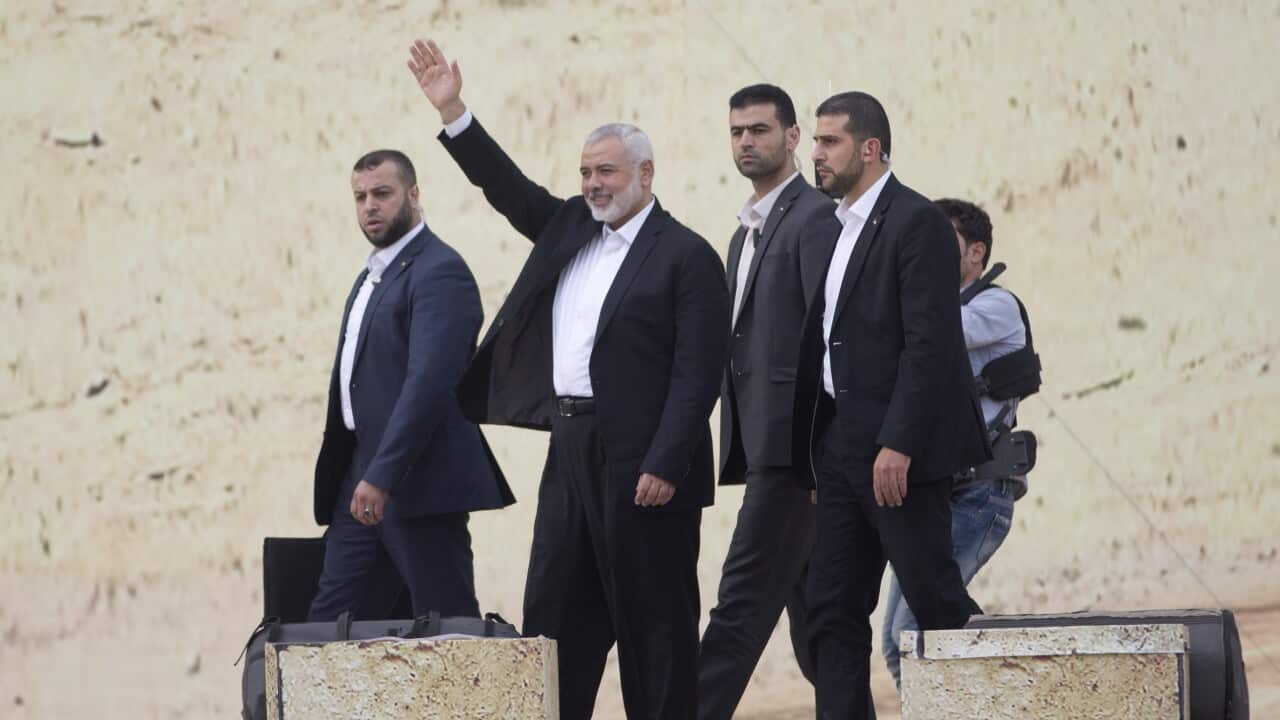On 7 October, the Palestinian group , in one of the most serious escalations of the Israel-Palestinian conflict in years.
The attack claimed 1,400 lives and 229 people were taken hostage, according to Israeli officials. , but Hamas says dozens have already been killed by Israel's retaliatory airstrikes.
By late October, Israeli airstrikes had killed over 8,306 people in Gaza — including 3,457 minors — according to Gazan medical authorities.
At that time, the Israeli military said it had already killed four prominent Hamas operatives, as a long-awaited ground invasion of Gaza began.
What is Hamas?
Hamas, or the Islamic Resistance Movement, was founded in 1987 during the first Palestinian Intifada, or uprising. It is backed by Shi'ite Iran and shares the Islamist ideology of the Muslim Brotherhood, which was established in Egypt in the 1920s.
It has run the Gaza Strip since 2007, after a brief civil war with forces loyal to the Fatah movement led by President Mahmoud Abbas, who is based in the West Bank and also heads the Palestine Liberation Organization (PLO).
The Hamas takeover of Gaza followed its win in Palestinian parliamentary elections in 2006 – the last time they were held. Hamas accused Abbas of conspiring against it. Abbas described what happened as a coup.
Since then, there have been numerous rounds of conflict with Israel, often involving Hamas rocket attacks from Gaza into Israel and Israeli airstrikes and bombardment of Gaza.
Hamas refuses to recognise the state of Israel and violently opposed the Oslo peace accords negotiated by Israel and the PLO in the mid-1990s.
Hamas has an armed wing called the Izz el-Deen al-Qassam Brigades, which has sent gunmen and suicide bombers into Israel. Hamas characterises its armed activities as resistance against Israeli occupation.

A Palestinian militant from the Izzedine al-Qassam Brigades, a military wing of Hamas. Source: AP / Adel Hana
Its 1988 founding charter called for the destruction of Israel, although Hamas leaders have at times offered a long-term truce, or Hudna in Arabic, with Israel in return for a viable Palestinian state on all Palestinian territory occupied by Israel in the 1967 war. Israel regards this as a ruse.
Hamas is part of a regional alliance comprising Iran, Syria and the , which all broadly oppose US policy in the Middle East and Israel.
While its power base is in Gaza, Hamas also has supporters across the Palestinian territories, and it has leaders spread across the Middle East in countries including Qatar.
and several Hamas officials including the group's leader Ismail Haniyeh and former head Khaled Meshaal regularly spend time in Doha.
Hamas, in its entirety, is designated as a terrorist organisation by countries including Australia, Israel, Canada, the UK and the US.
Some countries list only its military wing as a terrorist group.
The UN has not condemned Hamas in its entirety as a terrorist organisation, due to insufficient support from member states to do so during a 2018 vote.
Why did Hamas launch its attack on Israel in early October?
Hamas said its attack on 7 October was driven by Israel's escalated attacks on Palestinians in the West Bank, Jerusalem and against Palestinians in Israeli prisons.
"This is the day of the greatest battle to end the last occupation on earth," Hamas military commander Mohammed Deif said, announcing the start of the operation in a broadcast on Hamas media and calling on Palestinians everywhere to fight.
The recent escalation comes against a backdrop of , where a Palestinian authority exercises limited self-rule, opposed by Hamas.
In the West Bank, there have been stepped-up Israeli raids, Palestinian street attacks and assaults by Jewish settlers on Palestinian villages, according to a recent Reuters analysis.
Conditions for Palestinians have worsened under Netanyahu's hard-right government, the analysis says, and peacemaking has been stalled for years.
"How many times have we warned you that the Palestinian people have been living in refugee camps for 75 years, and you refuse to recognise the rights of our people?" Haniyeh said in a recent speech.
Other Middle Eastern geopolitical concerns behind recent attack
The same Reuters analysis argued that Hamas' October attack on Israel was also triggered by recent efforts to forge new regional security alignments that could threaten Palestinian aspirations for statehood and the ambitions of the group's main backer Iran.
Hamas' assault coincided with US-backed moves to push Saudi Arabia towards normalising ties with Israel in return for a defence deal between Washington and Riyadh, a move that would slam the brakes on Saudi Arabia's recent rapprochement with Tehran.
Palestinian officials and a regional source said Hamas' attack was also a message that the Palestinians could not be ignored if Israel wanted security and that any Saudi deal would scupper the detente with Iran, Reuters said.
"All the agreements of normalisation that you (Arab states) signed with (Israel) will not end this conflict," Haniyeh said on Al Jazeera television.
A regional source familiar with the thinking of Iran and that of the Iranian-backed Lebanese group Hezbollah added: "This is a message to Saudi Arabia, which is crawling towards Israel, and to the Americans who are supporting normalisation and supporting Israel. There is no security in the whole region as long as Palestinians are left outside of the equation."
"What happened is beyond any expectation," the source said, adding that the attack was "a turning point in the conflict."
Meanwhile, Saudi Arabia and Israel have both indicated they are moving closer to a normalisation deal. But sources previously told Reuters the kingdom's determination to secure a US defence pact meant it would not hold up a normalisation agreement to win substantive concessions for the Palestinians.
Laura Blumenfeld, a Middle East analyst at the Johns Hopkins School for Advanced International Studies in Washington, said Hamas may have lashed out due to a sense that it was facing irrelevance as efforts advanced toward broader Israeli-Arab relations.
"As Hamas watched the Israelis and Saudis move close to an agreement, they decided: no seat at the table? Poison the meal,” she said.


